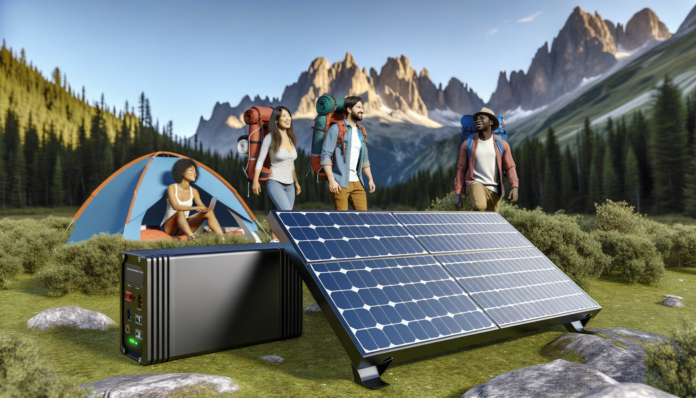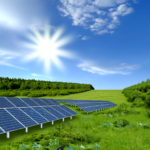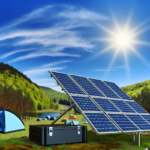Introduction to Solar Energy Storage
The Growing Need for Solar Energy
As the world increasingly turns to renewable energy sources to combat climate change and reduce reliance on fossil fuels, solar energy has emerged as a leading contender. The sun provides an abundant and inexhaustible source of energy, making it an ideal solution for sustainable power generation. The growing awareness of environmental issues and the need for clean energy alternatives have accelerated the adoption of solar technology across various sectors, from residential and commercial to industrial and recreational.
What is Solar Energy Storage?
Solar energy storage refers to the process of capturing and storing the energy generated by solar panels for later use. This is typically achieved through the use of batteries or other storage systems that can hold the energy until it is needed. Solar energy storage systems are essential for ensuring a consistent and reliable power supply, especially during periods when sunlight is not available, such as at night or on cloudy days. By storing excess energy produced during peak sunlight hours, these systems can provide a continuous power source, making solar energy a more viable and dependable option.
Benefits of Solar Energy Storage for Adventurers
For outdoor enthusiasts and adventurers, solar energy storage offers a range of significant benefits:
- Reliability: Solar energy storage systems provide a dependable power source, ensuring that adventurers have access to electricity even in remote locations where traditional power sources are unavailable.
- Portability: Many solar energy storage solutions are designed to be lightweight and portable, making them easy to carry and use during outdoor activities such as camping, hiking, and boating.
- Eco-Friendly: By harnessing the power of the sun, adventurers can reduce their carbon footprint and minimize their impact on the environment. Solar energy is a clean and renewable resource that does not produce harmful emissions or pollutants.
- Cost-Effective: While the initial investment in solar energy storage systems may be higher, the long-term savings on fuel and electricity costs can be substantial. Solar energy is free and abundant, making it a cost-effective solution for powering adventures.
- Convenience: Solar energy storage systems can power a wide range of devices and equipment, from smartphones and GPS units to portable refrigerators and lighting. This ensures that adventurers can stay connected, safe, and comfortable during their trips.
In conclusion, the growing need for sustainable energy solutions has made solar energy storage an essential component of modern power systems. For adventurers, the benefits of reliability, portability, eco-friendliness, cost-effectiveness, and convenience make solar energy storage an invaluable resource for powering their outdoor activities. As technology continues to advance, the future of solar energy storage looks promising, offering even more innovative and efficient solutions for adventurers and beyond.
Current Technologies in Solar Energy Storage
Types of Solar Batteries
Solar batteries are a cornerstone of solar energy storage, allowing users to store excess energy generated by solar panels for later use. There are several types of solar batteries, each with its own advantages and disadvantages:
- Lithium-Ion Batteries: These are the most popular due to their high energy density, long lifespan, and relatively low maintenance. They are lightweight and can be used in a variety of applications, from home energy storage to portable solar generators.
- Lead-Acid Batteries: Known for their reliability and cost-effectiveness, lead-acid batteries have been used for decades. However, they are heavier and have a shorter lifespan compared to lithium-ion batteries.
- Flow Batteries: These batteries use liquid electrolytes to store energy and are known for their scalability and long cycle life. They are ideal for large-scale energy storage but are less common in portable applications due to their size and complexity.
- Sodium-Ion Batteries: An emerging technology, sodium-ion batteries offer a more sustainable and potentially cheaper alternative to lithium-ion batteries. They are still in the development phase but show promise for future applications.
Portable Solar Chargers
Portable solar chargers are compact, lightweight devices designed to charge small electronics like smartphones, tablets, and cameras. They are perfect for adventurers who need to keep their devices powered while on the go. Key features of portable solar chargers include:
- Portability: These chargers are designed to be lightweight and easy to carry, making them ideal for hiking, camping, and other outdoor activities.
- Efficiency: Modern portable solar chargers use high-efficiency solar panels that can quickly convert sunlight into usable energy, even in less-than-ideal conditions.
- Durability: Many portable solar chargers are built to withstand harsh outdoor conditions, with features like water resistance and rugged construction.
- Versatility: They often come with multiple charging ports and adapters, allowing users to charge a variety of devices simultaneously.
Solar Generators
Solar generators are comprehensive energy storage solutions that combine solar panels, batteries, charge controllers, and inverters into a single unit. They are designed to provide reliable power in a variety of situations, from outdoor adventures to emergency backup. The main components of a solar generator include:
- Solar Panels: These collect sunlight and convert it into electricity.
- Battery Storage: The electricity generated by the solar panels is stored in batteries for future use.
- Charge Controller: This component regulates the flow of electricity into and out of the battery to protect it from damage.
- Inverter: This turns the stored energy in the batteries from direct current (DC) to alternating current (AC), which is what most devices use.
Solar generators offer several advantages:
- Sustainability: They are fueled by the sun, which means they don’t produce harmful emissions or rely on finite resources like fossil fuels.
- Convenience: They are easy to transport and can provide power in remote locations or during power outages, making them ideal for outdoor activities and emergency preparedness.
- Versatility: Solar generators can be used in a variety of settings, from camping trips to backyard parties, and can power everything from small appliances to electronic devices.
In summary, the current technologies in solar energy storage, including various types of solar batteries, portable solar chargers, and solar generators, offer a range of solutions to meet the diverse needs of adventurers and outdoor enthusiasts. These technologies not only provide reliable and sustainable power but also enhance the overall experience of exploring the great outdoors.
Innovations Shaping the Future
Advancements in Battery Technology
The future of solar energy storage is being revolutionized by significant advancements in battery technology. Traditional lithium-ion batteries have seen remarkable improvements in efficiency, longevity, and charging capabilities. However, the horizon extends far beyond these conventional solutions. Emerging technologies such as solid-state batteries, metal-air batteries, and sodium-ion batteries are gaining traction. These innovations promise to address critical challenges like resource scarcity and environmental impact, paving the way for more sustainable and scalable energy storage solutions.
Moreover, supercapacitors are emerging as a complementary technology to traditional batteries. Unlike batteries that store energy chemically, supercapacitors store energy as a static electrical charge, allowing for rapid charge and discharge cycles. This capability makes them ideal for applications requiring quick bursts of energy, thereby enhancing the overall efficiency and flexibility of solar energy storage systems.
Integration with Smart Devices
The integration of solar energy storage with smart devices is another groundbreaking development shaping the future. Smart grids, equipped with advanced communication and control systems, enable real-time monitoring and optimization of energy storage systems. This integration ensures a resilient and efficient energy infrastructure that can adapt to fluctuations in supply and demand while maximizing the utilization of renewable energy sources.
Smart home devices, such as thermostats, lighting systems, and appliances, can now be synchronized with solar energy storage systems to optimize energy consumption. For instance, a smart thermostat can adjust heating and cooling based on the availability of stored solar energy, thereby reducing reliance on the grid and lowering energy costs. Additionally, mobile apps and cloud-based platforms allow users to monitor and control their solar energy systems remotely, providing greater convenience and efficiency.
Emerging Trends in Solar Panels
Solar panel technology is also experiencing rapid advancements, contributing to more efficient and versatile solar energy storage solutions. One of the most exciting developments is the creation of ultra-thin solar panels that can be integrated into various surfaces, including windows, roofs, and even clothing. These panels are not only lightweight and flexible but also capable of capturing a broader spectrum of sunlight, including low-light conditions, thereby increasing their efficiency.
Another promising trend is the development of bifacial solar panels, which can capture sunlight from both sides. This design significantly boosts energy generation, especially in environments with reflective surfaces like snow or water. Additionally, researchers are exploring the potential of perovskite solar cells, which offer high efficiency at a lower cost compared to traditional silicon-based cells. These innovations are making solar panels more accessible and practical for a wide range of applications, from residential rooftops to portable solar chargers for adventurers.
In conclusion, the future of solar energy storage is being shaped by remarkable advancements in battery technology, the integration of smart devices, and innovative trends in solar panels. These developments are not only enhancing the efficiency and reliability of solar energy systems but also making them more accessible and user-friendly for a diverse range of applications. As these technologies continue to evolve, they hold the promise of a more sustainable and energy-efficient future for all.
Practical Applications for Outdoor Enthusiasts
Camping and Hiking
Camping and hiking offer exhilarating adventures, but the last thing anyone wants is to be stranded in the dark with a dead battery. Traditional power options like running your vehicle’s engine or using gas-powered generators can be noisy, fuel-consuming, and disruptive to the natural serenity. This is where solar power comes to the rescue.
**Portable Solar Panels:** Lightweight and easy to carry, portable solar panels can be set up anywhere to soak up the sun’s rays. Simply unfold, position towards the sun, and let the power flow. These panels are perfect for recharging devices, running lights, or even powering a small coffee maker.
**Solar-Powered Generators:** These portable powerhouses store the sun’s energy in a battery, ready to supply electricity whenever needed. From charging multiple devices to running a mini fridge, solar-powered generators are a reliable and eco-friendly option.
**Solar Chargers for Devices:** Solar chargers use the sun’s power to charge gadgets on the go. Whether capturing breathtaking landscapes or staying connected with loved ones, solar chargers ensure you never miss a moment.
**Solar-Powered Camping Gear:** From solar showers to solar lanterns, a variety of solar-powered camping gear is available to make your outdoor experience more comfortable and sustainable.
Boating and Marine Adventures
For boating and marine adventures, reliable power is crucial for navigation, communication, and safety. Solar energy offers a sustainable solution that doesn’t rely on fuel or noisy generators.
**Marine Solar Panels:** Designed to withstand harsh marine environments, these panels can be mounted on the deck or cabin roof. They provide a steady supply of power for essential equipment like GPS, radios, and lights.
**Solar-Powered Watermakers:** These devices use solar energy to convert seawater into fresh drinking water, ensuring you stay hydrated without carrying large quantities of bottled water.
**Solar-Powered Coolers:** Keep your catch fresh or your beverages cold with solar-powered coolers. These coolers use solar energy to maintain a consistent temperature, making them perfect for extended trips on the water.
**Solar Navigation Lights:** Enhance safety with solar-powered navigation lights. These lights charge during the day and automatically turn on at dusk, ensuring your boat is visible at night.
Living Off-Grid
Living off-grid requires a reliable and sustainable power source, and solar energy fits the bill perfectly. It provides independence from the grid and reduces reliance on fossil fuels.
**Solar Power Systems:** Comprehensive solar power systems can be installed to meet all your energy needs. These systems typically include solar panels, batteries, inverters, and charge controllers to provide a consistent and reliable power supply.
**Solar Water Heaters:** Use solar energy to heat water for showers, cooking, and cleaning. Solar water heaters are efficient and can significantly reduce your energy consumption.
**Solar-Powered Appliances:** From refrigerators to washing machines, a variety of solar-powered appliances are available to make off-grid living more comfortable and sustainable.
**Solar-Powered Security Systems:** Ensure your safety with solar-powered security cameras and lights. These systems operate independently of the grid, providing continuous surveillance and lighting.
In conclusion, solar energy storage solutions offer practical and sustainable options for outdoor enthusiasts, whether you’re camping, boating, or living off-grid. By harnessing the power of the sun, you can enjoy your adventures with the peace of mind that comes from having a reliable and eco-friendly power source.
Environmental and Economic Impact
Reducing Carbon Footprint
Solar energy storage plays a pivotal role in reducing the carbon footprint of outdoor adventures. By harnessing the power of the sun, adventurers can significantly cut down on the use of fossil fuels, which are traditionally relied upon for power in remote locations. This shift not only reduces greenhouse gas emissions but also minimizes air and noise pollution, making for a more serene and eco-friendly experience. For instance, using solar panels to power RVs and boats can drastically reduce the carbon emissions associated with these activities. The BougeRV 200 Watt Solar Panel, for example, offers a sustainable alternative to traditional fuel sources, helping to preserve the natural beauty of the environments we explore.
Cost Savings Over Time
While the initial investment in solar energy storage solutions can be substantial, the long-term financial benefits are noteworthy. Solar panels and batteries have low maintenance costs and can last for many years, providing a reliable source of energy without the recurring expenses associated with fuel. Over time, the savings on fuel and utility bills can offset the initial costs, making solar energy storage a cost-effective solution for adventurers. For example, the durability and efficiency of modern solar panels mean that users can enjoy free energy from the sun for decades, reducing the overall cost of their outdoor activities. Additionally, advancements in battery technology, such as lithium-ion and vanadium flow batteries, are making solar energy storage more affordable and efficient, further enhancing the economic benefits.
Supporting Sustainable Practices
Adopting solar energy storage solutions supports broader sustainable practices and contributes to the global effort to combat climate change. By choosing renewable energy sources, adventurers can promote environmental stewardship and inspire others to follow suit. Solar energy storage not only reduces reliance on non-renewable resources but also encourages the development and adoption of green technologies. This shift towards sustainability is crucial for preserving natural habitats and ensuring that future generations can enjoy the same outdoor experiences. Moreover, integrating solar panels into outdoor gear, such as solar-powered backpacks and tents, enhances the sustainability of outdoor activities by providing a renewable source of energy for essential devices and equipment. This integration not only reduces the environmental impact but also promotes a culture of sustainability among outdoor enthusiasts.
In conclusion, the environmental and economic impacts of solar energy storage are profound. By reducing carbon footprints, offering cost savings over time, and supporting sustainable practices, solar energy storage is paving the way for a greener and more sustainable future for outdoor adventures.
How to Choose the Right Solar Energy Storage Solution
Choosing the right solar energy storage solution is crucial for maximizing the benefits of your solar power system, especially for adventurers who rely on portable and efficient energy sources. Here are some key factors to consider:
Assessing Your Energy Needs
Before selecting a solar energy storage solution, it’s essential to evaluate your energy requirements. Consider the following:
- Daily Energy Consumption: Calculate the total wattage of the devices you plan to power. This includes everything from small gadgets like smartphones and cameras to larger appliances like portable fridges and lights.
- Duration of Use: Determine how long you need to power your devices. For instance, a weekend camping trip will have different energy needs compared to a week-long off-grid adventure.
- Backup Power: Consider if you need a backup power source for emergencies. This is particularly important for remote locations where access to traditional power sources is limited.
Understanding your energy needs will help you choose a storage solution with the appropriate capacity and features.
Evaluating Portability and Durability
For adventurers, portability and durability are critical factors:
- Weight and Size: Choose a solar energy storage solution that is lightweight and compact, making it easy to transport. This is especially important for activities like hiking and camping where every ounce counts.
- Build Quality: Look for robust and weather-resistant designs that can withstand harsh outdoor conditions. Features like water resistance, dustproofing, and shockproofing can enhance the durability of your storage solution.
- Ease of Use: Ensure the system is user-friendly with simple setup and operation. This includes intuitive interfaces and easy-to-read displays.
A portable and durable solar energy storage solution will ensure reliable power in various outdoor environments.
Understanding Efficiency and Capacity
Efficiency and capacity are vital for the performance of your solar energy storage solution:
- Battery Efficiency: Look for high-efficiency batteries that can store and release energy effectively. Lithium iron phosphate (LiFePO4) batteries are known for their high efficiency and long lifespan.
- Storage Capacity: Choose a battery with sufficient capacity to meet your energy needs. Capacity is measured in watt-hours (Wh) and indicates how much energy the battery can store. For example, a 500Wh battery can power a 50W device for 10 hours.
- Charging Speed: Consider the charging speed of the battery. Faster charging times mean less downtime and more continuous power availability.
Balancing efficiency and capacity will help you get the most out of your solar energy storage solution.
Reading Reviews and Seeking Recommendations
Before making a final decision, it’s beneficial to read reviews and seek recommendations:
- Customer Reviews: Look for reviews from other users who have similar energy needs and use cases. Pay attention to feedback on performance, reliability, and customer service.
- Expert Opinions: Consult expert reviews and comparisons to understand the pros and cons of different products. Experts often provide in-depth analysis and insights that can help you make an informed decision.
- Recommendations: Ask for recommendations from friends, family, or online communities who have experience with solar energy storage solutions. Personal experiences can provide valuable insights and help you avoid potential pitfalls.
Gathering information from various sources will ensure you choose a reliable and effective solar energy storage solution.
By carefully assessing your energy needs, evaluating portability and durability, understanding efficiency and capacity, and reading reviews and seeking recommendations, you can select the right solar energy storage solution to power your adventures and support sustainable practices.
Conclusion and Future Outlook
The Road Ahead for Solar Energy Storage
The future of solar energy storage is brimming with potential and innovation. As technology continues to advance, we can expect significant improvements in the efficiency, capacity, and affordability of solar energy storage solutions. Emerging technologies such as solid-state batteries, advanced lithium-ion variants, and even novel concepts like gravity-based storage systems are set to revolutionize the way we store solar energy. These advancements will not only enhance the reliability of solar power but also make it more accessible to a broader range of users, from urban dwellers to remote adventurers.
Moreover, the integration of solar energy storage with smart grids and IoT devices will enable more efficient energy management. This synergy will allow for real-time monitoring and optimization of energy usage, ensuring that stored solar power is utilized in the most effective manner possible. As these technologies become more mainstream, we can anticipate a future where solar energy storage is a ubiquitous part of our daily lives, powering everything from our homes to our outdoor adventures.
Encouraging Sustainable Adventures
For outdoor enthusiasts, the advancements in solar energy storage present an exciting opportunity to embrace more sustainable practices. Portable solar chargers, solar generators, and high-capacity batteries are becoming increasingly efficient and user-friendly, making it easier than ever to power your adventures with clean energy. Whether you’re camping in the wilderness, sailing the open seas, or living off-grid, solar energy storage solutions can provide a reliable and eco-friendly power source.
Adopting these technologies not only reduces your carbon footprint but also enhances your connection with nature. By relying on renewable energy, you contribute to the preservation of the very environments you seek to explore. This shift towards sustainable adventuring is not just a trend but a necessary evolution in how we interact with the natural world. As more adventurers adopt solar energy storage solutions, we can collectively make a significant impact on reducing environmental degradation and promoting conservation efforts.
Final Thoughts
In conclusion, the future of solar energy storage is bright and full of promise. The continuous advancements in technology, coupled with a growing awareness of the need for sustainable practices, are driving the adoption of solar energy storage solutions across various sectors. For adventurers, these innovations offer a unique opportunity to power their journeys in an environmentally responsible manner.
As we look ahead, it is crucial to continue supporting and investing in solar energy storage technologies. By doing so, we not only pave the way for a more sustainable future but also empower individuals to make eco-friendly choices in their daily lives and adventures. The road ahead is clear: embracing solar energy storage is not just a step towards sustainability, but a leap towards a cleaner, greener world.





